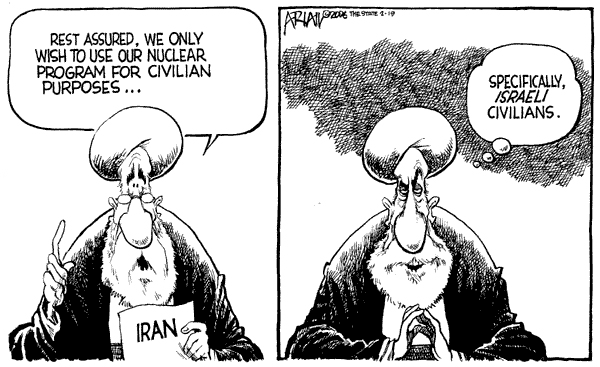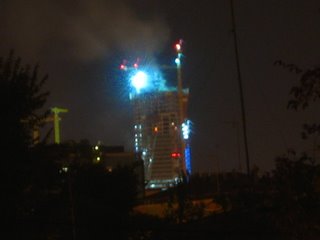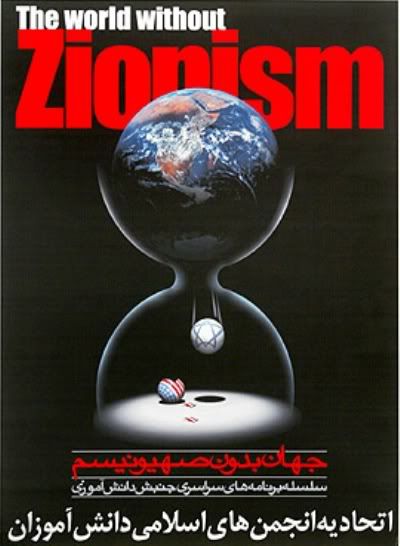En un post anterior mencionaba que había comprado dos libros acerca del conflicto entre Israel y Palestina. Mencioné asimismo que mi conocimiento sobre el tema era escaso, por lo que había hecho pocas menciones al caso. No en el caso de la guerra contra Hizbullah o respecto al anti-semitismo, ya que con respecto al primer caso hablamos del derecho a defenderse de una nación contra una organización terrorista ilegal y el cual tendría que haber sido desarmado. Con respecto al segundo caso, estamos hablando de un fenómeno que existe desde siglos y siglos, y he emitido opiniones respecto a las críticas sobre Israel en su actuación en la reciente guerra contra Hizbullah.
Los dos libros y la lectura de decenas de artículos al respecto me han otorgado un conocimiento básico, no amplio, pero lo suficiente como para entender el conflicto.
Me gustaría asimismo comentar brevemente los dos libros; The case for Israel de Alan Dershowitz, se limita a ofrecer argumentos a favor de Israel, dejando de lado las propias críticas del autor a ciertas políticas de Israel, como menciona desde el primer momento en el libro.
Este libro ha recibido algunas críticas desde puntos de vistas anti-israelíes acusando al autor, principalmente de haberlo plagiado. El principal crítico es Norman Finkelstein, un autor judío que destaca por sus opiniones anti-israelís. Podéis ver una disputa entre los dos autores al respecto
aquí . Incluso hay una amplia entrada en el
Wikipedia .
Antes de adquirir el libro me apresuré en leer la disputa, pero el hecho de que Finkelstein tratase de desprestigiar todo el argumento de Dershowitz en base a una supuesta plagiación y no por los argumentos, me inclinó más a comprarlo. Algunos expertos dicen, además, que esas acusaciones no están debidamente
fundamentadas.
La principal crítica que yo le hago a Dershowitz, y es entorno a lo que quiero dirigir este post, es sobre los acuerdos de Camp David y posteriormente en Taba.
El otro libro que he leído es The Case Against Israel, de Michael Neumann, otro judío anti-israelí, de estos no faltan. De Neumann se sabe que dijo que
no le importaba la verdad, ni la justicia, ni comprensión, ni ninguna otra cosa, su principal misión es defender a los palestinos.
He tratado de leer el libro con una mente abierta a toda argumentación, y las cosas que dice Neumann son interesantes, pero teniendo en cuenta que efectivamente trata de manipular al lector llevándolo a una idea omitiendo hechos relevantes.
Para Neumann el Estado Israelí es ilegítimo. Para sostener esto, se basa en unos argumentos que en muchos casos ilegitimaría cualquier nación, por lo que no considero válida ese argumento, y hay muchas razones y circunstancias por las que el estado de Israel sí tiene derecho a existir.
Bien, luego trata sobre los asentamientos, que es parte del tema del que quiero hablar, ya que tiene que ver también con los acuerdos de Camp David y Taba. Y me gustaría que cualquier lector interesado y con conocimiento, participe en este post vía comentarios.
He estado mirando los acuerdos de Camp David y posteriormente Taba. De Camp David se dijo en su momento, y se sigue diciendo, que Barak realizó la oferta más generosa que pudiera realizar, y que el rechazo de Arafat indicaba que la única meta de los Palestinos era acabar con la existencia de Israel. Mirando lo que se ofreció a Arafat en Camp David, sinceramente, no me parece que se puede calificar de generoso.
Este tema es, además, más complicado ya que los Palestinos emiten documentos, mapas y ofertas que nada tiene que ver con lo que realmente se ofertó. Es evidente que si lo que ofrecían era lo dicen los palestinos, era inaceptable. Yo creo que mienten, y que se les oferto otra cosa, pero igualmente esa otra cosa no es del todo aceptable. Para poder discutir esto, necesitamos partir de la misma propuesta.
Según la
entrada en el Wikipedia:
Territorios:
Barak offered to form a Palestinian State initially on 73% of the West Bank (that is 27% less than the Green Line borders) and 100% of the Gaza Strip. In 10 to 25 years the West Bank area would expand to 90% (94% excluding greater Jerusalem) [8] [9]. The West Bank would be separated by a road from Jerusalem to the Dead Sea, with free passage for Palestinians although Israel reserved the right to close the road for passage in case of emergency. The Palestinian position was that the annexations would block existing road networks between major Palestinian populations. In return, the Israelis would cede 1-3 % of their territory in the Negev Desert to Palestine. Arafat rejected this proposal and did not make a counteroffer, possibly because he thought debate was futile.
Jerusalem:
A particularly virulent territorial dispute revolved around the final status of Jerusalem. Although offered much of East Jerusalem, the Palestinians rejected a proposal for "custodianship," though not sovereignty, over the Temple Mount, demanding complete sovereignty, which for Jews would have meant losing a bond with both the Mount and the attached Western Wall.
Refugiados:
he Palestinians stated that the proposed solution did not adequately address the issue of the Palestinian refugee problem. The Palestinians argued that any meaningful peace settlement would have to take the future of these people into account. In particular, they called for a right of return or just compensation and an Israeli acknowledgment that they too had been responsible for the creation of the refugee problem.
Quiero plasmar también lo que dice Dennis Ross, Coordinador Especial de Medio Oriente del Departamento de Estado de EEUU y actor importante en los acuerdos de Camp David.
Ross menciona lo siguiente:
Now, the fact is at Camp David, Arafat offered personally absolutely nothing. The only new idea Arafat raised in the two weeks we were at Camp David is that the temple did not exist in Jerusalem— hardly an indication of someone who is committed to reconciliation with his negotiating partner when you question the core of the other side’s faith.
FRIEDMAN: It was a new idea though.
ROSS: It was certainly a new idea. [Laughter.] In fact, when he first mentioned it in my presence, and said the temple didn’t exist in Jerusalem, it existed in Nablus, I thought he was joking. I should have known better— and I said, “Well, you better watch out, because the Israelis will now claim Nablus.” [Laughter.] And, lo and behold, he said, “No.” So he didn’t offer anything, but the fact is, his negotiators did. And it’s actually an important thing to bear in mind.
His negotiators agreed, or at least presented three basic concessions. One is that, in fact, they would accept a principle of three settlement blocs on the West Bank to accommodate 80 percent [of] the settlers. They didn’t agree on what the geographic size of the seven blocs would be, but they presented this.
Two, they accepted that all the Jewish neighborhoods of East Jerusalem would be part of Israel. Now, bear in mind all those neighborhoods are beyond the June 4, 1967, line [that separated Israel and the West Bank]. And the third thing is they accepted a limited security presence for the Israelis on the West Bank. Now, we didn’t hear that from Arafat, but his negotiators did say that, and it’s important to present that— not only because it’s true, but it has two messages. One is, to an Israeli audience that says, “All right, we can understand the way you view Arafat, but bear in mind there are Palestinian partners out there who are prepared to do things that in fact represented a significant move for them.” And, secondly, it’s even more important in my mind for Palestinians to see that they had negotiators who were prepared to do this, and that compromise is acceptable, and that people who were credible in Palestinian terms were prepared to present that.
FRIEDMAN: So it was the Jewish neighborhoods of Jerusalem, the settlement blocs— what was the third again?
ROSS: Limited security presence with Israel in the West Bank.
FRIEDMAN: In the West Bank, that’s very interesting. What about the other side? How much did Barak really offer on the back of that envelope?
ROSS: Barak— I mean, again, one of the myths— Barak offered the moon, and Arafat said no. Well, what is true is that Arafat said no, because Arafat said no literally to everything. When you read the account, you’ll see even the last night of Camp David President Clinton and I came up with a series of additional ideas— and the president stretched even farther than I thought it made sense to stretch— and Arafat, as it turns out, was able to restrain his enthusiasm. [Laughter.] But you know I think the fact is that Barak at Camp David did go farther than any Israeli had ever gone before, not as far as we were to go in the Clinton ideas, but let me just summarize what he was prepared to accept.
At Camp David, Barak was prepared to accept 9 percent— basically 91 percent of the West Bank would be Palestinian, and there would be a 1 percent swap. He was prepared to accept in Jerusalem, in East Jerusalem— East Jerusalem is divided into about 10 outer neighborhoods, about three or four inner neighborhoods, and then you have the Old City of Jerusalem, the walled city of Jerusalem. And Barak was prepared to accept that all but one or two of the outer neighborhoods would be sovereign, and the inner neighborhoods would have autonomy. They would have their own ability to engage in planning and zoning, but Israel would retain a kind of nominal sovereignty. The Old City he was prepared to divide into the following: the Muslim and Christian quarters of the Old City would be Palestinian, have Palestinian sovereignty, and the Armenian and Jewish quarters would have Israeli sovereignty.
Now, just to put this in perspective, the reaction of Leah Rabin [widow of Yitzhak Rabin] after Camp David was to criticize Barak, and she said what Barak was prepared to accept at Camp David is something that Yitzhak Rabin would never have accepted. Now, everyone knows that Leah Rabin was determined to promote the legacy of her husband, and the fulfillment of that legacy was reaching peace. And yet she was critical of Barak afterwards. So he may not have offered the moon, but he crossed thresholds that had previously been unthinkable.
And the problem, as I said, is that Arafat simply said no to everything. And Palestinian negotiators understood they had something significant, and they wanted to continue a process. Barak at the end of Camp David basically wanted to say, “That’s it.” As I say in the book, he says to me, “Twenty years of peacemaking is over.” And I actually say to him, “Look, you’re the leader of a state— you can’t say if we don’t make peace the only alternative is war, because then you’re going to have a war.” And the reality is even though he felt that way, he felt he had been, in a sense, betrayed. He felt he had been set up. He felt he was exposed before the Israeli public— and yet, as it turned out, he wasn’t prepared to follow through on the threat to say, “All right, we’re done with peacemaking; it’s all confrontation.” And by early September he was asking us to come with additional ideas.
Yo entiendo y defiendo que Israel ocupe militarmente los territorios ocupados hasta que los líderes Palestinos cesen su beligerancia. Lo que no puedo entender es que se crean que los Palestinos tengan que aceptar que Israel se anexione parte de su territorio. Que se crean que los Palestinos deban aceptar que se construya una carretera desde Jerusalén hasta el Mar Muerto separando Cisjordania en dos bloques y que Israel se reserve el derecho a cerrarlo cuando crea oportuno.
En cuanto a Jerusalén, según Ross se ofreció lo siguiente:
The Old City he was prepared to divide into the following: the Muslim and Christian quarters of the Old City would be Palestinian, have Palestinian sovereignty, and the Armenian and Jewish quarters would have Israeli sovereignty.
Desde mi punto de vista esto es bastante aceptable.
Con respecto a los refugiados, creo que la oferta de Barak fue muy aceptable. Según páginas pro-palestinas, el derecho de retorno de los refugiados es la
Clave:
The implementation of the Palestinian Right of Return, based on UN GA resolution 194, is THE KEY for ending the conflict. So any peace process that does not address the R.O.R. is nothing but a temporary cease fire, and the conflict eventually would flare up again. It should be emphasized that the majority of the Palestinian people are refugees, and for any agreement to hold, it must neutralize this vital political block.
Bueno, este argumento esconde el verdadero motivo de por qué el derecho de retorno de los refugiados es la clave, es la clave para terminar con el Estado judío. No pueden volver todos los refugiados porque significaría que como ciudadanos tendrían derecho a voto, y con el tiempo acabarían con el Estado judío por vía democrática. No tiene sentido insistir en el retorno. Los bienes confiscados por los países árabes a los refugiados judíos pueden pagar a los refugiados palestinos, y una ayuda de Israel y la Comunidad Internacional soluciona ese problema por completo.
En cuanto a
TabaEsta fue más generosa que la de Camp David, y según los dos bandos, fue lo más cercano a lo que se llegó. Creo también que como se puede apreciar en el resumen que hizo nuestro Desatinos, los Palestinos expresaron una clara intención de negociar y llegar a una solución. También lo comenta Dennis Ross; que los negociadores palestinos sí que intentaron acercar posturas.
Sobre Taba, creo que los israelíes deben entender el punto de vista de los palestinos también. Por ejemplo:
The Israeli side maintained that the state of Palestine would be non-militarized as per the Clinton proposals. The Palestinian side was prepared to accept limitation on its acquisition of arms, and be defined as a state with limited arms. The two sides have not yet agreed on the scope of arms limitations, but have begun exploring different options.
Entiendo que Israel quiera que la capacidad militar de los Palestinos sea limitada, ahora bien, desde el punto de vista de los Palestinos, ¿qué tipo de soberanía es esa en que otra nación te limita la capacidad?
Cosas como este último ejemplo creo que hay muchas, e Israel debe entender que Palestina debe ser un estado soberano, que decide por si mismo lo que debe hacer.
Finalizando, no es verdad que el terrorismo Palestino se deba a que Israel ocupe sus territorios, ya que sus ataques se remontan incluso a antes de la declaración oficial del Estado de Israel. Tampoco es verdad que todos los Palestinos sólo busquen la eliminación de Israel, también los hay que defienden la existencia de dos Estados, ahora bien, éstos no van a renunciar a que el territorio sea menor del que delimita la Línea Verde y que Israel se anexione parte de ella, ni van a aceptar que otro Estado limite su soberanía.
Partiendo de esto, que creo que según los hechos es lo más correcto, se deberá llegar a un acuerdo.
+ Actulización: He estado mirando lo que ponía en mi libro de Historia de COU sobre el conflicto. Y no existe ese tema, ni siquiera una pequeña mención. He revisado el libro de 1º de Bachillerato de mi hermano, y en ella sí que hacen una pequeña mención, pero muy, muy breve, que no alcanza para entender mínimamente el conflicto. Tampoco les culpo, en perspectiva, con todo que da de si la historia contemporánea, sólo merece una pequeña introducción. Pero para tomar en cuenta, ya que significa que la mayoría sabe del conflicto de lo que ve en la tele, y creo que bastante gente ha denunciado ya que los medios españoles informan desde una perspectiva un tanto anti-israelí.





















